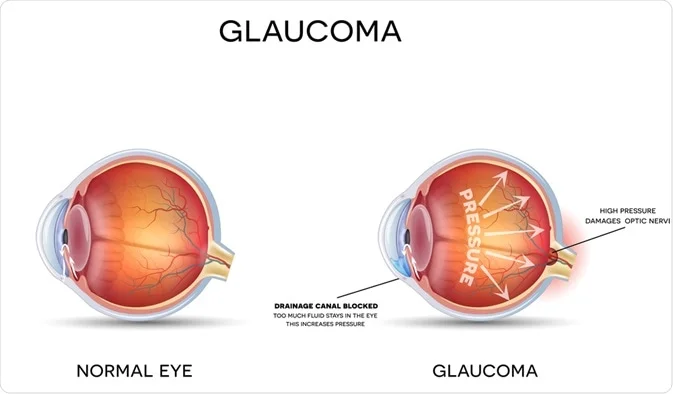Glaucoma – Understanding the Symptoms, Causes, and Treatments

Glaucoma is a serious eye condition that can cause permanent vision loss if left untreated. It occurs when there is damage to the optic nerve, which is responsible for transmitting visual information from the eye to the brain. In this article, we will delve deeper into the topic of glaucoma, exploring its symptoms, causes, and treatments.
Understanding Glaucoma
Glaucoma is a group of eye conditions that affect the optic nerve. It is a leading cause of blindness and can develop at any age. There are two main types of glaucoma: open-angle glaucoma and closed-angle glaucoma.
Open-Angle Glaucoma
Open-angle glaucoma is the most common type of glaucoma. It occurs when the trabecular meshwork, which drains the fluid in the eye, becomes blocked. This causes a buildup of pressure, which damages the optic nerve over time.
Closed-Angle Glaucoma
Closed-angle glaucoma occurs when the iris (the colored part of the eye) blocks the eye’s drainage angle, leading to a sudden increase in eye pressure. This type of glaucoma requires immediate medical attention, as it can cause permanent vision loss within hours.
Symptoms of Glaucoma
Glaucoma can often develop slowly without any noticeable symptoms. This is why it is often called the “silent thief of sight.” However, certain signs and symptoms may indicate the presence of glaucoma:
- Loss of peripheral vision
- Tunnel vision
- Halos around lights
- Blurred vision
- Eye pain
- Redness in the eye
- Nausea and vomiting (in the case of closed-angle glaucoma)
If you are experiencing any of these symptoms, it is important to seek medical attention immediately. Early detection and treatment can help prevent permanent vision loss.
Causes of Glaucoma
The exact cause of glaucoma is still unknown. However, certain risk factors increase the likelihood of developing the condition:
- Age (glaucoma is more common in people over 60)
- Family history of glaucoma
- African or Hispanic ethnicity
- High eye pressure
- Thin corneas
- Nearsightedness
- Previous eye injuries
While these risk factors may increase the likelihood of developing glaucoma, anyone can develop the condition, regardless of age or medical history.
Treating Glaucoma
The treatment for glaucoma depends on the type and severity of the condition. In most cases, the goal of treatment is to lower the pressure in the eye and prevent further damage to the optic nerve.
Eye Drops
Eye drops are often the first line of treatment for glaucoma. They work by reducing the amount of fluid in the eye and lowering the pressure in the eye.
Oral Medications
In some cases, oral medications may be prescribed to lower the pressure in the eye. These medications work by reducing the production of fluid in the eye or by increasing the drainage of fluid from the eye.
Laser Surgery
Laser surgery may be recommended in cases where eye drops and oral medications are ineffective. This type of surgery works by increasing fluid drainage from the eye, thereby lowering the pressure in the eye.
Conventional Surgery
Conventional surgery may be recommended in cases where laser surgery is not effective. This type of surgery involves creating a new drainage channel for fluid to leave the eye, thereby reducing the pressure in the eye.
Conclusion
In conclusion, glaucoma is a condition that can have serious consequences if left untreated. It is important to understand the symptoms, causes, and treatment options available for this condition.
Regular eye exams and early detection are key to preventing vision loss. If you are experiencing any symptoms of glaucoma, make sure to seek medical attention immediately. Proper treatment and management make preserving your vision and maintaining a good quality of life possible.
FAQs
Can glaucoma be cured?
- No, glaucoma cannot be cured. However, with proper treatment and management, it is possible to slow down the progression of the disease and prevent vision loss.
Is glaucoma hereditary?
- Yes, glaucoma can run in families. If you have a family history of glaucoma, it is important to inform your eye doctor and get regular eye exams.
Can glaucoma be prevented?
- There is no surefire way to prevent glaucoma. However, you can reduce your risk by maintaining a healthy lifestyle, exercising regularly, and avoiding smoking.
What is the best treatment for glaucoma?
- The best treatment for glaucoma depends on the type and severity of the condition. Your eye doctor will work with you to determine the best course of treatment for your individual needs.
How often should I get my eyes checked for glaucoma?
- If you are over the age of 40, it is recommended to get a comprehensive eye exam every 2-4 years.
However, your eye doctor may recommend more frequent exams if you have a family history of glaucoma or other risk factors.